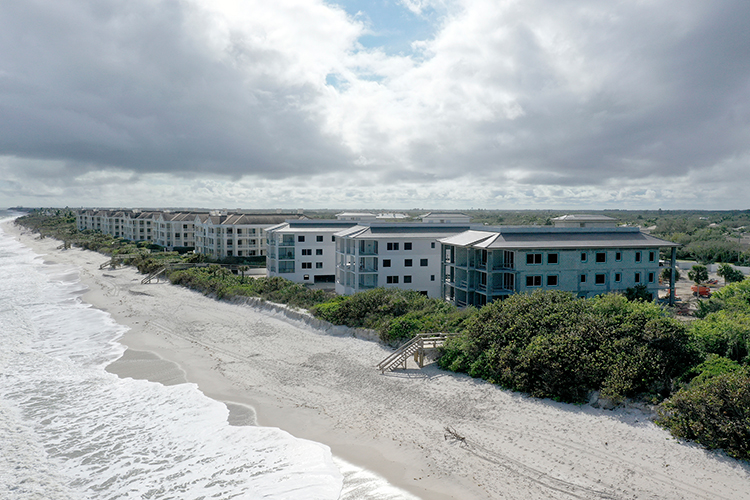
As homeowners’ associations, condos and cooperative boards head into fall budgeting season to determine how much maintenance fees need to be increased for 2024, and whether special assessments need to be levied, they are facing a gigantic triple whammy.
In addition to crushing rates for additional insurance, and new costs imposed by the mandatory inspections and repairs laws passed in the wake of the Surfside collapse in South Florida, they now also face a new legal requirement to “fully fund” reserves for major future maintenance and repair items.
This amendment to existing state laws on condo associations, also passed in the wake of the Surfside investigations, prevents HOAs from “kicking the can down the road” and letting future owners or generations foot the bill for needed major repairs.
The new legislation forcing all HOAs to fully fund reserves doesn’t officially kick in until the end of next year for the 2025 budget to be prepared next fall, but local HOAs are hearing the footsteps.
There were collective gasps from the audience at one recent HOA board meeting of a condo complex on A1A as the president said maintenance fees for 2024 will likely go up by 50 percent. That was on top of sizable special assessments of thousands of dollars levied earlier this year for huge increases in insurance premiums and for terrace and balcony repairs deemed necessary by structural inspections.
“The long-term financial ramifications on condo owners are going to be catastrophic,” says Gwen Simmons, the owner and resident of a condominium in the Riverview complex on the mainland along Indian River Boulevard. “Thousands of condominium owners will not be able to pay the assessments, particularly those who are elderly, on a fixed income and have no significant savings.
“It will be a tsunami,” added Simmons, a former member of her HOA board. “This is going to end in a great catastrophe, with people potentially being evicted from their condominium homes.”
“It’s time to pay the piper,” the Miami law firm of Bilzin Sumberg says on its website, “for older condominiums where waiving or reducing reserves has been an annual tradition.
Some condominiums may learn that the price tag of continuing on (this way) is simply not achievable.”
The new Florida law on condo reserves will require full funding every year for 10 long-term building components, which boards had previously been able to defer – roofs, load-bearing walls, floors, the foundation, fire protection systems, plumbing, electrical systems, waterproofing and exterior painting, windows, and “any other item that has a deferred maintenance expense or replacement cost exceeding $10,000.”
As to what needs to be fixed, by when and at what cost, those determinations need to be made by outside experts, based on visual inspections.
In practice, to be fully funded, if a roof has to be replaced in 10 years at an estimated cost of $1 million, an HOA has to add at least $100,000 to its reserves in each of the next 10 years to make sure it has the full funds on hand when it’s time to undertake the project.
Up to now, HOAs had been allowed to waive or reduce reserve contributions through a membership vote, but the new legislation puts an end to that “out” as of the end of next year.
There are no reliable estimates on how many of the local HOAs have already responsibly continued to fully fund reserves, and thus will have little trouble complying with the new laws, and how many have chosen not to do so, by paying only for regular maintenance items like landscaping, pool service and pest control on an ongoing basis.
Elliott Merrill, one of the main property management firms active in the area, has declined to respond to detailed messages asking how the firm is helping its HOA and condo association clients deal with the new laws on fully funded reserves.
Will Lee, president of the Keystone Property Management Group, another leading local firm, says he estimates that just more than half of his HOA and condo association clients in the Vero Beach area already have fully funded reserves. That leaves close to half of Keystone’s clientele with major gaps to fill.
“This other half of the condos will have to raise money to fund their reserves,” Lee said.
“They can do it in one of three ways – raise monthly maintenance fees, ask the owners for special assessments, or borrow money, or all of the above, or a combination of all of the above.”
Lee said it is almost impossible to calculate the exact impact of the new legislation mandating fully funded reserves. “How much maintenance fees will go up across the board, whether it’ll be 20 percent or more, or how much the special assessment will have to be, will depend on any number of variables.”
The main factor, Lee explained, is how close to fully funded the condo associations’ reserve funds are, and how diligent the past structural inspections, if any, have been in identifying long-term maintenance items that will need attention in the next few years.
Overall, Lee said, he does not expect the cost increases associated with fully funding association reserves to be the main driver in increasing ownership costs for individual condominium owners over the next couple of years.
“As far as a more immediate quantifiable effect on costs, the insurance crisis has been the real biggie,” Lee said, referring to 200 percent or sometimes even 300 percent increases in homeowners’ insurance coverage for hurricane and floods – if associations could obtain it at all in the wake of the departure from Florida of several national insurance companies unwilling to take on more risk at any price.
Lee explained that there is a connection between the crisis in insurance costs and the need to fully fund reserves going forward. “A well-maintained building will eventually be able to get you lower insurance premiums,” Lee said.



